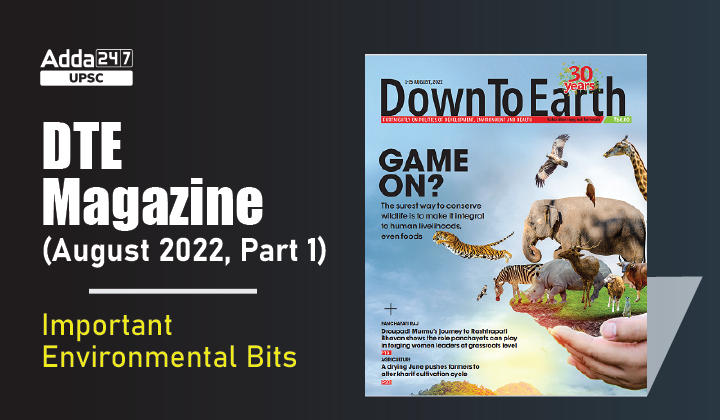Table of Contents
Down To Earth Magazine is a fortnightly magazine focusing on politics of environment and development, published in New Delhi, India.
UPSC Previous years’ questions on Development, Environment, Health and Disaster Management give us a clear idea about the increased importance of Down To Earth Magazine.
Down To Earth Magazine is one of the most important and indispensable source for UPSC Civil Services Exam Preparation. Keeping this in mind, here, we come with ”Gist Of Down To Earth Magazine” which covers important environmental current affairs articles in smooth pointed form, keeping in mind the demand of UPSC aspirants.
Marburg Virus
Why in News?
- The World Health Organization on July 18 confirmed two cases of the Marburg virus in Ghana, a first for the country.
- Around 100 others who came in contact with the infected individuals were quarantined and under observation for symptoms, which include high fever and external bleeding.
About Marburg Virus
- A cousin of the equally deadly Ebola virus, according to the World Health Organization (WHO), the Marburg virus was first identified after 31 people were infected and seven died in simultaneous outbreaks in 1967 in Marburg and Frankfurt, Germany & Belgrade, Serbia.
- The outbreak was traced to African green monkeys imported from Uganda. But the virus has since been linked to other animals.
- Among humans, it is spread mostly by people who have spent long periods in caves and mines populated by bats.
- A 2005 outbreak in Angola killed more than 300 people.
- There is no treatment or vaccine so far. Previous outbreaks of the disease have been seen in Angola, the Democratic Republic of the Congo, Kenya, South Africa and Uganda.
Revised Graded Response Action Plan (GRAP)
Why in News?
- The Commission for Air Quality Management unveiled a revised Graded Response Action Plan (GRAP) on July 13 to curb air pollution in the National Capital Region (NCR).
- An expert group constituted by the CAQM had suggested revisions to the existing GRAP which comprises measures to be taken when the air quality worsens in Delhi-NCR.
What is Revised GRAP?
- GRAP sets emergency measures when air quality worsens in NCR.
- The revised plan suggests taking action based on the air quality index (AQI) rather than particulate matter concentrations and banning construction and plying of diesel-based four-wheelers after the AQI crosses certain thresholds.
- The revised Graded Response Action Plan (GRAP) to deal with air pollution this winter will come into force with effect from October 1, according to the Commission for Air Quality Management (CAQM).
Four Stages Of Adverse Air Quality
- In the revised plan, there are four stages of adverse air quality — ‘poor’ (AQI from 201 to 300), ‘very poor’ (AQI from 301 to 400), ‘severe’ (AQI from 401 to 450) and ‘severe +’ (AQI more than 450).
- Actions under the ‘very poor’, ‘severe’ and ‘severe +’ categories are to be invoked at least three days in advance of the AQI reaching that particular stage.
- This will be based on forecasts provided to the CAQM by the India Meteorological Department and the Indian Institute of Tropical Meteorology.
Africa To Pay For Europe’s Energy Crisis
Why in News?
- At the latest meeting of the Group of 7 (G7) countries, host Germany and Italy watered down a pledge to end financing for overseas gas projects.
- The pledge was made at the 26th Conference of the Parties to the UN Framework Convention on Climate Change last year, and at the meet in June, new loopholes were introduced for temporary financing so countries can tide over the energy crisis due to the Russia-Ukraine war.
- The move is in line with how Germany and Italy are increasing fossil fuel investment in Africa in recent months.
- Italy, which has lowered its Russian energy imports from 40 per cent at the start of the year to 25 per cent, has secured deals with Algeria, Angola, Egypt, and the Republic of the Congo.
- Germany, which imports 35 per cent of its energy from Russia, is meanwhile pursuing investment in Senegal.
Key Possible Impacts on Africa
- The subsequent reliance of the African countries on fossil fuel exports can slow their economic growth by three times and hinder diversification into renewable energy.
- Moreover, as Europe’s own renewable energy goals are met, demand will decrease, and Germany and Italy will leave Africa to deal with defunct infrastructure.
- The fact that they will leave African countries holding the stranded assets is just as immaterial to them as their contributions to climate change have been.



 TSPSC Group 1 Question Paper 2024, Downl...
TSPSC Group 1 Question Paper 2024, Downl...
 TSPSC Group 1 Answer key 2024 Out, Downl...
TSPSC Group 1 Answer key 2024 Out, Downl...
 UPSC Prelims 2024 Question Paper, Downlo...
UPSC Prelims 2024 Question Paper, Downlo...




